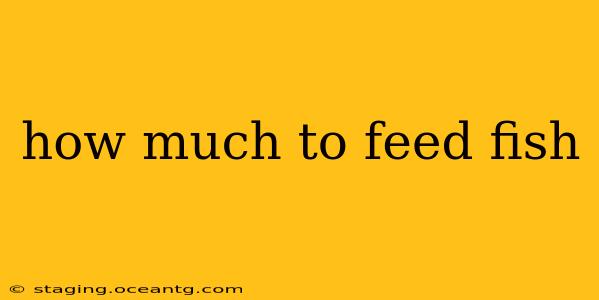Feeding your fish might seem simple, but getting it right is crucial for their health and well-being. Overfeeding leads to water quality issues and health problems, while underfeeding results in malnutrition and stunted growth. This guide will help you determine the perfect amount of food for your finned friends.
How Much Should I Feed My Fish?
The golden rule is to feed your fish only as much as they can eat in 2-3 minutes. This seemingly small amount is usually sufficient. Avoid scattering food throughout the tank; this leads to uneaten food accumulating, deteriorating water quality, and potentially harming your fish.
The actual quantity depends on several factors:
- Fish Species: Different species have different appetites and metabolic rates. Larger, more active fish will naturally consume more than smaller, less active ones. Research your specific fish species to understand their dietary needs.
- Fish Size: A larger fish will naturally need more food than a smaller one of the same species. Adjust the feeding amount accordingly as your fish grow.
- Tank Size: A larger tank generally means more space and less competition for food. This doesn't necessarily mean you should feed more, but it influences how you distribute the food.
- Feeding Frequency: Most fish benefit from multiple small feedings per day rather than one large one. Aim for 1-3 small feedings per day, depending on the species and their activity level.
What Happens if I Overfeed My Fish?
Overfeeding has several negative consequences:
- Water Quality Issues: Excess food decomposes, releasing ammonia and other harmful toxins into the water. This can lead to illnesses and even death in your fish.
- Bloated Fish: Overeating can cause your fish to become bloated and uncomfortable, potentially leading to digestive problems.
- Stunted Growth: While counterintuitive, constantly overfeeding can lead to slower growth in some fish species.
- Aggressive Behavior: Competition for excessive food can trigger aggression among your fish.
What Happens if I Underfeed My Fish?
While less immediately noticeable than overfeeding, underfeeding also poses serious risks:
- Malnutrition: Lack of essential nutrients can lead to weakened immune systems, slow growth, and health problems.
- Stunted Growth: Insufficient food prevents fish from reaching their full potential size.
- Increased Susceptibility to Disease: Underfed fish are more vulnerable to diseases and parasites.
What Type of Fish Food Should I Use?
The best fish food is species-specific. Some fish thrive on flakes, others prefer pellets, and some require live or frozen foods. Again, research your fish's dietary requirements. Look for high-quality fish food that contains a balanced mix of proteins, vitamins, and minerals.
How Often Should I Feed My Fish?
This depends on the species, as mentioned earlier. However, a general guideline is:
- Smaller, more active fish: 2-3 times a day
- Larger, less active fish: Once or twice a day
- Fasting once a week: A scheduled fast once a week helps to cleanse their system.
What are the signs of an overfed fish?
Signs of an overfed fish include a visibly swollen belly, uneaten food lingering in the tank, and cloudy or foul-smelling water. If you see these signs, immediately reduce the amount of food you're feeding your fish.
What are the signs of an underfed fish?
Signs of an underfed fish include noticeable weight loss, lethargy, and a lack of appetite. If you notice your fish are exhibiting these symptoms, increase the amount of food slightly and monitor their condition.
Conclusion:
Finding the right feeding schedule and amount for your fish takes observation and adjustment. By carefully monitoring your fish's behavior and water quality, you can ensure they receive the optimal nutrition they need to thrive. Remember to research your specific fish species for tailored feeding recommendations. Remember that consistency is key! A regular feeding schedule and careful observation will go a long way towards keeping your fish healthy and happy.
